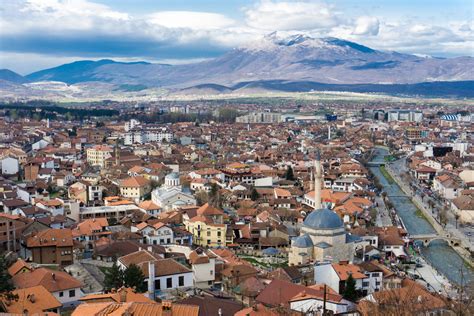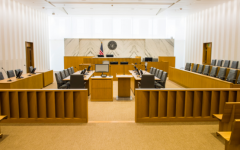
Kosovo. (Photo: state.gov)
The Shadow of Justice: When International Justice Fails the People of Kosovo
We must end this era of selective accountability
By Bekim Collaku, December 16, 2024 2:45 am
In a world that proclaims justice as the bedrock of human rights and international order, the selective application of that justice casts long, damning shadows. As conflicts rage on—from Ukraine to Gaza, Yemen to Somalia—the machinery of international law, embodied by the International Criminal Court (ICC), seems to function in a perplexing and inconsistent manner. Yet nowhere is this failure of justice more evident than in Kosovo, where justice has morphed into a weapon of injustice.
Kosovo’s liberation war against Slobodan Milošević’s regime in the late 1990s was a fight for survival and freedom. The atrocities committed by Serbian forces against the ethnic Albanian population are well-documented. Despite these known horrors, the burden of war crimes has consistently and disproportionately fallen upon Kosovo’s former freedom fighters—the very people who defended their right to exist.
Since the war ended in 1999, a relentless cycle of indictments and trials has plagued Kosovo’s leaders and its people. The Kosovo Liberation Army (KLA), which fought to break free from Milošević’s genocidal grip, has been scrutinized in numerous courts: the International Criminal Tribunal for the former Yugoslavia (ICTY), UNMIK courts, EULEX, Kosovo’s own judicial system, and now, the Specialist Chambers in The Hague. Each court has seemed determined to entangle Kosovo’s struggle for freedom in a web of accusations, as though rewriting history with judicial ink.
This overemphasis on Kosovo comes while other global atrocities continue unchecked. The ICC should, by rights, be inundated with cases of war crimes in Ukraine, Gaza, Yemen, and the Democratic Republic of Congo. The 72% rise in civilian casualties in conflicts worldwide, as reported by the United Nations in 2023, ought to galvanise international tribunals. Instead, the focus remains on Kosovo, a nation of less than two million people, turned into an international laboratory for war-crime trials. This glaring imbalance betrays the very principles of justice.
The Symbol of Selective Justice
The case of former Kosovo President Hashim Thaçi underscores a troubling double standard in international justice. Once celebrated as a hero and a peacemaker — even considered for the Nobel Peace Prize — Thaçi was on his way to Washington, D.C., in 2020 to attend a historic peace summit with Serbia hosted by then-President Donald Trump. In a stunning turn of events, he was indicted by the Specialist Chambers in The Hague. The indictment, led by U.S. prosecutor Jack Smith, who would later pursue legal action against President Trump himself, was more than a legal intervention; it was a political upheaval with far-reaching consequences. The arrest of Thaçi, along with other key former KLA leaders—Kadri Veseli, Jakup Krasniqi, and Rexhep Selimi—sent shockwaves through Kosovo’s political landscape. It disrupted the fragile trajectory of the young nation’s state-building efforts and raised questions about the timing and motivations behind the charges. This incident reveals a deeper pattern of selective justice that continues to shape not only Kosovo’s future but also the broader geopolitical dynamics of post-conflict societies.
For over four years, these men have languished in detention, denied the presumption of innocence that international law supposedly upholds. The injustices don’t end there. Recently, in a desperate bid to prolong the trial, the Specialist Prosecutor’s Office has levelled new charges against former president Thaçi for allegedly “attempting to influence witnesses” from his prison cell. The latest additional charge also feels like a desperate attempt to justify the staggering one billion euros spent on the court’s operations. This accusation defies logic, especially given that the justification for his continued detention was to prevent such influence. This charge reeks of a court scrambling to salvage its legitimacy, its credibility long eroded.
The Legacy of a Flawed Mandate
The Specialist Chambers was established after a controversial report by Dick Marty, which accused the KLA of organ trafficking. Despite the questionable credibility of this report, it was adopted by the Parliamentary Assembly of the Council of Europe in 2011. This endorsement led to the creation of a court with a disturbingly narrow mandate: to investigate alleged crimes by the KLA, specifically related to organ harvesting. Meanwhile, atrocities committed by Serbian forces—including ethnic cleansing, massacres, and systematic rape—were excluded from its jurisdiction. The outcome is a grotesque distortion of justice, where those who fought for liberation are put on trial while the true perpetrators remain beyond scrutiny.
Instead of fostering reconciliation, this court has deepened the wounds of a fragile nation. By focusing exclusively on the alleged crimes of the oppressed, the court not only undermines Kosovo’s fight for freedom but also emboldens revisionist narratives that seek to equate the liberators with the oppressors. This is not justice; it is institutionalised injustice.
Political Manipulation in Legal Guise
Justice must be impartial, but in Kosovo’s case, it seems blindfolded by geopolitical interests. Thaçi and his comrades’ trials are more than judicial acts; they are political levers that have shifted power dynamics in Kosovo. None of them have been indicted for the alleged organ-harvesting crimes that served as the very foundation for imposing and establishing this court. However, their imprisonment paved the way for Prime Minister Albin Kurti’s rise to power. Whether by design or coincidence, the Specialist Chambers have influenced Kosovo’s political landscape in ways that courts should never be allowed to.
The implications extend beyond Kosovo. When international courts are seen to serve political agendas, they erode faith in the global justice system. For nations struggling to emerge from the shadows of conflict, this selective justice sends a chilling message: the powerful dictate the rules, and those with influence tip the scales of justice.
A Cry for True Justice
Kosovo’s people demand and deserve justice that recognises historical truths, not one that weaponises the law to settle political scores. The pursuit of justice should heal wounds, not inflict new ones. The Specialist Chambers has failed in this fundamental mission. Its legacy risks being remembered not as a beacon of justice but as a symbol of betrayal and manipulation.
History has shown that truth cannot be suppressed forever. The day will come when the distortions of the present are rectified, and the sacrifices of Kosovo’s freedom fighters are honoured without caveat. Until then, the scars of this judicial injustice will remain—a testament to a world that often confuses justice with power.
The international community must confront this uncomfortable reality. To reclaim the promise of justice, we must end this era of selective accountability. Only then can we ensure that the shadow of justice no longer darkens the hopes of those who fought for freedom.
The views expressed in this article are solely those of the author.
- The Shadow of Justice: When International Justice Fails the People of Kosovo - December 16, 2024




